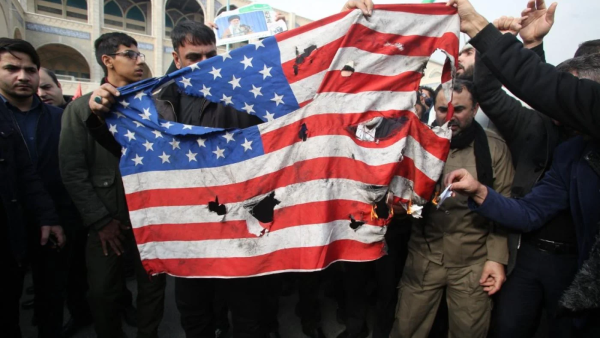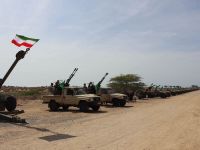After World War I and especially World War II, the United States expanded its power in the Middle East by using its political, military, economic, diplomatic, and soft tools in the region. After the collapse of the Soviet Union in 1991, Washington's presence and influence in the Middle East became much wider. However, in the past years, there are many signs and symptoms showing the decline of the position of the Middle East in American foreign policy.
Since the beginning of Joe Biden's presence in the White House, domestic issues such as the Corona crisis and its consequences and the economic problems of Americans have been the priority of the Biden government. It should also be noted that attention to the Middle East did not play a significant role in Biden's election campaign.
Report on DESTRUCTION & WAR CRIMES #US committed in #Mideast
— ALI RAUF JASWAL (@Ali_Jaswal) August 12, 2022
From #Pakistan @HassShad: US role is of a fire fighter who put entire forest on fire@AminaMJanjua: #US tortured male, females&even children in prisons@_AhmedQuraishi@usembislamabad @libijian2@zlj517 @NoamanAMajid https://t.co/ABE1JO3srw
American public opinion also considered the costly military interventions of the past like the invasion of Iraq, and realists did not consider military presence as the only way to secure American interests. Also, some think tanks and a number of decision-making circles in the United States put less emphasis on the Middle East, regarding the United States 's strategic interests.
Geopolitical and political-security
However, during a trip to the Middle East on July 16, 2022, US President Joe Biden announced that Washington "will not walk away and leave a vacuum for China, Russia or Iran to fill”. But the realists in America should consider the appeasement of the United States over Russia, China, and Iran. Also, most of the traditional allies in the region are worried about the possibility of the US turning to the Indian and Pacific Oceans.
Lots of destabilization in the middle east is partly due to progressive Israel's role and military activity, their warmongering foreign policy and expansionism which is supported by the largest superpower, the US, and their army. Don't have to read /pol/ to see that connection.
— Rapid_Uplift (@Upl_91) September 6, 2022
In fact, the policy of containment and strategic confrontation with China in three areas (geo-economics, geopolitical and geo-cultural) is also considered in the Middle East. In this regard, the United States using formats like I2U2 plans to strengthen its efforts to curb China's influence in the Middle East and force Beijing to pay the cost in the Middle East region.
While in the future we may see a global transition from uni-polarity (the United States as the world's superpower) to a bipolar or multipolar world, the United States foreign policy has long been paying attention to the rise of China and Russia's role in the Middle East.
‘US flies two nuclear-capable B-52 bombers over the Middle East in show of force as tensions with Iran reach fever pitch following latest talks collapse’ https://t.co/d8cRStcd1P Everyone wants to provoke a fight these days. ? beats to WW3. pic.twitter.com/EroVOOXdEJ
— lc (@Chirpingoutloud) September 5, 2022
Meanwhile, with Putin's invasion of Ukraine, the expansion of relations between Iran and China, the continued closeness of Iran and Russia, fear of the unity of Russia and China in the region, the strengthening of relations between the UAE and Saudi Arabia with Russia and China, and even the growing relationship between Israel and China, have caused concern for the United States.
In the meantime, it seems that Washington considers putting pressure on regional countries to limit cooperation with Russia and China, strengthen the strategic dimensions of relations with Sunni allies, and reduce the range of pressure on them.
Despite the previous humiliation of Mohammed bin Salman, the Saudi crown prince, Biden's previous words about Saudi Arabia, the publication of the American intelligence report on the Jamal Khashoggi murder, etc., Washington’s approach toward Saudi Arabia has been modified.
In this regard, strengthening partnerships with countries against threats, commitment to guarantee freedom of navigation through Middle East waterways and safe passage of oil, and avoiding the presence of hostile forces in the region have all been given more attention.
In another aspect of Biden's approach towards Israel and Palestine, support for a two-state solution, the resumption of humanitarian aid to the Palestinians, military, diplomatic and security support for Israel, and ensuring the security and military dominance of Israel are still very important.
In addition, despite the siege and unprecedented pressure, and the United States sanctions and threats, Iran has practically not retreated. In the meantime, it seems that the management of the enemy, the acceptance of Iran's presence and historical role in regional affairs, ignoring the removal of Iran from the region, attention to the containment, and reduction of Iran's power and influence in the long term have been considered more by Washington. At the same time, Washington does not want to focus on solving the issue of Iran's nuclear program, which will increase Iran's activity in regional affairs.
It also seems that stopping Riyadh's direct support in the case of Yemen and even playing the role of mediator in resolving the conflict in Yemen is still under consideration. Apart from this, considering the situation of Europe in the Ukraine crisis, the United States does not want the instability of the Middle East to reach Europe. In addition, it seems that the United States has highlighted the red line of not attacking ISIS or other "armed organizations" on the United States soil.
As Qatar attempts to mediate between the US and Iran, analysts say that it is replicating the role that Oman had played in the lead-up to the 2015 nuclear deal.
— Middle East Eye (@MiddleEastEye) September 2, 2022
Will Qatar be able to ease decades-long hostilities between the two nations?https://t.co/6unvR02OPm
Change of view or reduction of military presence in the Middle East
After years, Washington is trying to reduce its presence in Middle East wars (wars without a clear reason and without a clear goal). The complete withdrawal from Afghanistan and the massive reduction of the American military presence in the Middle East do not mean the complete cessation of the American military presence and it has been done according to a road map, but Washington’s focus on Asia and even its disappearing from the Middle East have been faced with reactions from the allies.
While in 2020, the United States had approximately 17 military bases in Iraq, Syria, Kuwait, and Qatar, reducing the cost of the US military's more than $800 billion per year is part of America's approach. In fact, Washington mostly pursues reorganizing forces, reducing anti-missile systems, sending unnecessary facilities to essential missions, developing new patterns of military presence, avoiding entering into regional conflicts, and handing over the responsibility of resolving conflicts to regional actors in line with its interests.
Economy, trade, and arms sales
While trade with the Middle East is much lower compared to other regions, many of Washington’s traditional partners in the Middle East are strengthening cooperation with China. China is the first trading partner of 11 countries in the Middle East.
What role should the US play in the Middle East? We asked former US Ambassador to Israel @Martin_Indyk for his answer in 60 seconds flat. ⤵️ https://t.co/uCtjy5HN9x
— Chicago Council on Global Affairs (@ChicagoCouncil) September 1, 2022
In the meantime, although the United States does not have the ability to compete with China in this area and the economic importance of the Middle East has also decreased for Washington, it is trying to remain influential by giving incentives, such as a billion-dollar contribution to food security, more focus on education, agriculture and initiatives, promotion of regional projects in the field of energy, free trade and investment.
With Russia's invasion of Ukraine, and disruption of world energy markets, the Middle East's role as the largest oil exporter has regained its importance. Therefore, putting aside the tension with Riyadh, is a necessary reaction for Biden, due to Russia's war in Ukraine.
In fact, Washington is trying to convince Saudi Arabia and the Arab members of OPEC to increase their oil production.
Also, prevention of disruption of the food supply chain by the joint formula I2U2 (India, Israel, United Arab Emirates, and the United States) is being followed. In another dimension, the sale of weapons to Saudi Arabia and the United Arab Emirates is a kind of readjustment of the United States arms sales policies to increase their ability to deal with ballistic missile threats in the region and reduce the allies' military relations with Russia and China.
Members of Congress discussed the potential for US coronavirus vaccines to be vehicles for soft power in the Middle East https://t.co/ZDB5GOkPdy by @Adam_Lucente
— Al-Monitor (@AlMonitor) June 25, 2021
Diplomacy and strengthening of soft power
Some recent polls have shown a decrease in support for Washington in the Middle East and North Africa compared to an increase in support for China. However, despite the hard choice between American values, human rights, and national interests; support for regional kingdoms, commitment to human rights, and fundamental freedoms in American foreign policy have been more prominent than during the Trump era.
In fact, in order to strengthen its humanitarian and developmental role in the region, the United States has adopted approaches such as strengthening relations with the citizens, increasing humanitarian aid, helping to deal with the Corona epidemic, empowering women, increasing opportunities for young people and entrepreneurs, and activating English language learning programs in line with diplomacy and strengthening its soft power.
Vision
The United States has long been one of the most essential players in the Middle East and continues to have important interests in the region. But the realities have changed in the region in the last decade. Although, since January 2021 and upon entering the White House, Biden has paid attention to stopping the war in Yemen and stopping the sale of weapons to some countries in the region, ending the war in Yemen, and the need to hold fair elections in Libya, etc., but it seems that Washington no longer sees the Middle East as the main priority of its geopolitical interests compared to other regions.
However, the role of the United States in the Middle East is still strategic and decisive.
In the meantime, despite the challenges facing the United States government in the Middle East, including the risk of popularity, elections inside the country, the nuclear agreement with Iran, the war in Yemen, human rights issues, and the deadlock in the Palestinian-Israeli conflict, the approach of Washington is likely to reduce the previous threats, seeking new opportunities, increasing civilian options, more inclusive diplomacy, repairing relations and emphasizing the commitment to international organizations.







